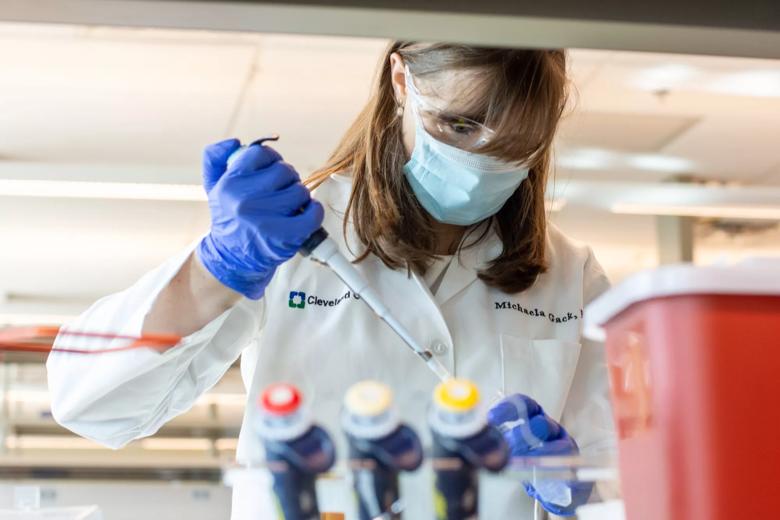Findings published in Nature Microbiology


Image content: This image is available to view online.
View image online (https://assets.clevelandclinic.org/transform/65242143-bbf3-44c8-aee7-de13b6da5ef0/2020-1013_CCFL_FRIC_Dr-Michaela-Gack002-scaled_jpg)
Michaela Gack, Ph.D.
PORT ST. LUCIE, FL: Researchers from Cleveland Clinic’s Florida Research and Innovation Center (FRIC) have identified a potential new target for anti-COVID-19 therapies. Their findings were published in Nature Microbiology.
Led by FRIC scientific director Michaela Gack, Ph.D., the team discovered that a coronavirus enzyme called PLpro (papain-like protease) blocks the body’s immune response to the infection. More research is necessary, but the findings suggest that therapeutics that inhibit the enzyme may help treat COVID-19.
“SARS-CoV-2 – the virus that causes COVID-19 – has evolved quickly against many of the body’s well-known defense mechanisms,” Gack said. “Our findings, however, offer insights into a never-before characterized mechanism of immune activation and how PLpro disrupts this response, enabling SARS-CoV-2 to freely replicate and wreak havoc throughout the host. We discovered that inhibiting PLpro may help rescue the early immune response that is key to limiting viral replication and spread.”
One of the body’s frontline immune defenses is a class of receptor proteins, including one called MDA5, that identify invaders by foreign patterns in their genetic material. When the receptors recognize a foreign pattern, they become activated and kick-start the immune system into antiviral mode. This is done in part by increasing the downstream expression of proteins encoded by interferon-stimulated genes (ISGs).
In this study, Gack and her team identified a novel mechanism that leads to MDA5 activation during virus infection. They found that ISG15 must physically bind to specific regions in the MDA5 receptor – a process termed ISGylation – in order for MDA5 to effectively activate and unleash antiviral actors against invaders. They showed that ISGylation helps to promote the formation of larger MDA5 protein complexes, which ultimately results in a more robust immune response against a range of viruses.
“While discovery of a novel mechanism of immune activation is exciting on its own,” Gack said, “we also discovered a bit of bad news, which is that SARS-CoV-2 also understands how the mechanism works, considering it has already developed a strategy to block it.”
The research team shows that the coronavirus enzyme PLpro physically interacts with the receptor MDA5 and inhibits the ISGylation process.
“We’re already looking forward to the next phase of study to investigate whether blocking PLpro’s enzymatic function, or its interaction with MDA5, will help strengthen the human immune response against the virus,” Gack said. “If so, PLpro would certainly be an attractive target for future anti-COVID-19 therapeutics.”
Postdoctoral fellow GuanQun “Leo” Liu, Ph.D., a member of Gack’s laboratory at the FRIC, is the lead author on the study, which was supported by the National Institutes of Health. The FRIC – which complements and expands research underway at Cleveland Clinic’s Lerner Research Institute and Cleveland Clinic Florida’s five regional hospitals – is located in Port St. Lucie, Florida, and is closely integrated with the Global Center for Pathogen Research & Human Health.
Cleveland Clinic is a nonprofit multispecialty academic medical center that integrates clinical and hospital care with research and education. Located in Cleveland, Ohio, it was founded in 1921 by four renowned physicians with a vision of providing outstanding patient care based upon the principles of cooperation, compassion and innovation. Cleveland Clinic has pioneered many medical breakthroughs, including coronary artery bypass surgery and the first face transplant in the United States. Cleveland Clinic is consistently recognized in the U.S. and throughout the world for its expertise and care. Among Cleveland Clinic’s 82,600 employees worldwide are more than 5,786 salaried physicians and researchers, and 20,700 registered nurses and advanced practice providers, representing 140 medical specialties and subspecialties. Cleveland Clinic is a 6,728-bed health system that includes a 173-acre main campus near downtown Cleveland, 23 hospitals, 280 outpatient facilities, including locations in northeast Ohio; Florida; Las Vegas, Nevada; Toronto, Canada; Abu Dhabi, UAE; and London, England. In 2024, there were 15.7 million outpatient encounters, 333,000 hospital admissions and observations, and 320,000 surgeries and procedures throughout Cleveland Clinic’s health system. Patients came for treatment from every state and 112 countries. Visit us at clevelandclinic.org. Follow us at x.com/CleClinicNews. News and resources are available at newsroom.clevelandclinic.org.
Editor’s Note: Cleveland Clinic News Service is available to provide broadcast-quality interviews and B-roll upon request.